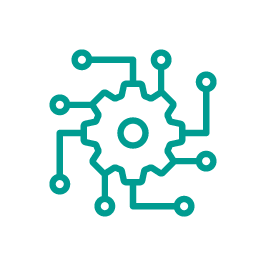A health trust is ‘taking the robot out of the human’ to alleviate the mundane workloads of small, time-poor teams at its two hospitals, making more time for clinicians to concentrate on patient care.
A robotic process automation (RPA) programme implemented by The Calderdale and Huddersfield NHS Foundation Trust (CHFT) at its two hospitals - Huddersfield Royal Infirmary and Calderdale Royal Hospital in Halifax – is already seeing some significant time and cost savings.
The programme is harnessing digital workhorses – bots - to carry out computer-based processes they have been programmed to do, working just like a human would.
At a basic level, if the process is rule based and requires the use of a keyboard or a mouse, it has the potential to be automated using intelligent RPA. The system is particularly beneficial where processes are repetitive with minimal variation in how data is processed.


Julian Chadha, CHFT’s RPA General Manager, explains:
“Because bots can work 24/7, 365 days a year and don’t make human errors, they can work through processes such as the admin associated with a backlog, they can validate patients on a waiting list quicker and ultimately perform any objective process done by a clinician.
“We have five bots in service, but because they can work around the clock, the output is greater than the collective efforts of five humans.
“We have calculated that one bot is capable of doing the equivalent work of 4.5 human whole time equivalents, giving us a total output equal to 22.5 human WTEs, a huge increase in capability and time saved.”
RPA – emulating the way humans use digital systems
A bot is programmed to log into a system with its own username and password to complete its assigned task. It cannot ‘think’ for itself, but simply does the work it has been programmed to do and then logs out again.
The bot is equipped with ‘intelligent automation’, or cognitive automation, the concept of which is to emulate the way people use digital systems, the decisions they make and the processes they follow.
The technology can work across IT applications, transferring key information from one system to another without the need to directly integrate the system.
It provides the opportunity, as the solution embeds, to release staff time to focus on valued added processes whilst routine tasks are performed to a consistent output by the bot, thus improving the workloads of those whose roles are now supported by RPA, while some senior clinicians have seen mundane, time-consuming tasks removed from their day-to-day work.
RPA in action
One example of RPA in action is supporting the colorectal cancer nursing team where bots are preparing their surveillance clinics for patients returning for their 12-month blood test check-up.
This was previously done by a team of six highly skilled Band 6 and 7 nurses on the cancer team, who had to visit each patient’s record and request a standard blood test. They then had to print out the form, put it in an envelope, address it and take it to the post room – a process that had to be repeated up to 40 times each week.
Now a bot can access a list of patients six weeks in advance of their appointment. It requests a standard blood test for each one, creates a digital blood form, creates a letter and sends it to the Trust’s postal service.
The new bot-driven process is saving the team almost 30 minutes per patient per week – an average of about 15 hours a week. A similar automation has been applied for the urology team checking on patients on the prostate cancer pathway, again saving 15 hours per week on average.
Evaluating the ‘hard’ and ‘soft’ benefits of RPA
CHFT is working to a business case that RPA will cost it approximately £720,000 over the five years it has licensed the cognitive automation software, with an anticipated cost saving of approximately £2m over the same period.
While the Trust see the expenditure as a ‘hard’ cost, it also recognises the ‘softer’ benefits created from RPA that are more difficult to evaluate – such as the released staff time to focus on value-added processes.
It also sees it as investing in staff welfare and job satisfaction that could increase staff retention rates. Removing the burden of mundane, repetitive processes from staff – taking ‘the robot out of the human’ – means staff members are happier and have more time to do what they enjoy, which is engaging with colleagues and patients.

Sign up for CHFT’s RPA whitepaper
Such is the benefit of RPA at CHFT, it has commissioned a white paper chronicling its RPA journey, with detailed benefits and further examples of where it has been put to productive use, more instances of cost savings, and advice on how to communicate and implement the technology successfully.
Simply leave us you name; role and email address and we’ll share a copy with you.
How we can support your RPA journey
Our RPA service includes support, management and development of robotic process automations on the Blue Prism platform. Learn more about THIS' RPA work and how THIS can support you in reaching your goals.
Find out more about our other services

Bespoke Service
In addition to our core services of digital health solutions, we offer bespoke services and can tailor our solutions to each customers’ needs. We can combine a number of services into a package, discuss other service solutions that your organisation may benefit from, including new innovations and collaborative projects. Contact us to discuss your requirements.

Request a free consultation
Want to know more? We offer face-to-face or online demonstrations of our services along with brochures and other information resources to suit your needs. Get in touch to see how we can help.
Request
Case studies and insights
As a leading digital healthcare organisation with proud NHS links, we believe in sharing insights into the work we do, the issues our clients face and the latest developments in our field. View all our case studies and insights.
What our customers have to say
“THIS have provided Spectrum Community Health with quality service for over 10 years. They consistently strive to meet our IT needs and digital ambitions in a supportive partnership approach.”
Sharon Hardcastle
Director of Finance, Spectrum Community Health CIC
Judy has asked for Spectrums thanks to be passed on to the Service Desk and all support staff for the efforts we are going to help and support them.
Judy Threlfall-Sykes
Head of Digital, Spectrum Community Health CIC
“Really want to thank Daniel P for all his help, he was really patient and helpful. Clearly communicated what he was doing and that he would contact me back to test that things were working.”
CHFT
"Problem quickly resolved and gave information about how to resolve in the future.”
Wakefield CCG
Who we work with
Supporting organisations throughout the UK
Across the UK, we work closely with NHS and healthcare organisations in many different locations. From our roots in Yorkshire, we support clients across England, Scotland, Wales and Ireland.
Examples of our NHS clients include London’s Great Ormond Street Hospital and hospital trusts in Southampton, Oxford, Cambridge, Nottingham, Derby, Birmingham, Liverpool, Manchester, Middlesbrough, North Tees & Hartlepool, Newcastle Upon Tyne, Edinburgh, Lanarkshire and Glasgow.








